Following 16 years of impactful research and training of African agricultural scientists, partners have reignited passion for furthering their work with the launch of WACCI 3.0. This renewed commitment will see partners of the West Africa Centre for Crop Improvement at the University of Ghana commit a colossal investment of resources over the next decade to training farmers and researchers.
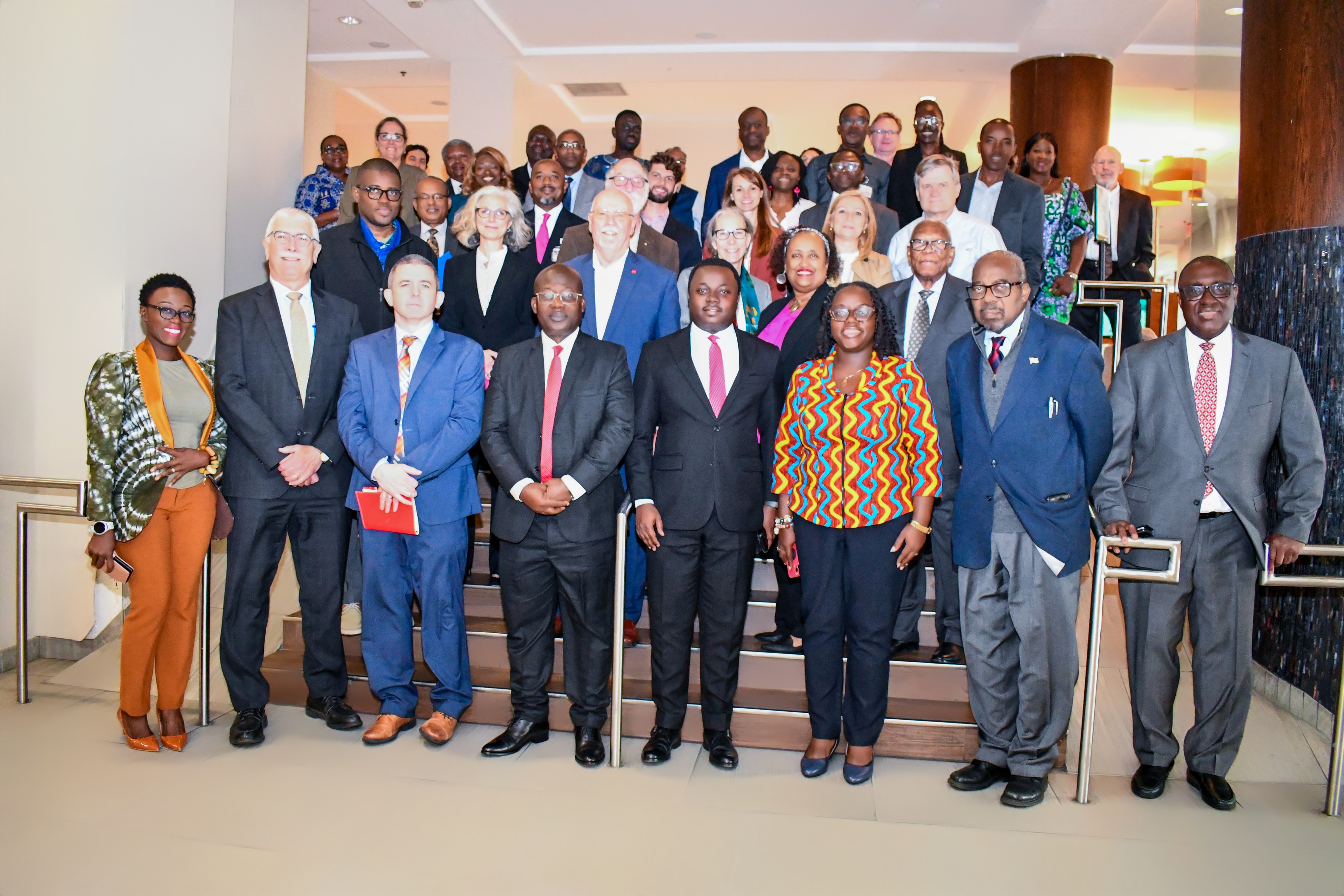
At the launch of this new framework and direction for the WACCI dream, held in Silver Spring, Maryland, USA, the April event was titled "Seeds of Tomorrow: Cultivating Global Partnerships for Africa's Agricultural Renaissance”. It brought together agricultural science leaders from government, academia, development agencies and the private sector to deliberate on enhancing existing partnerships and forging new ones for strengthening crop resilience and nurturing innovative agricultural practices that ensure food and nutrition security across the continent.
In delivering welcome and opening remarks, Vice-Chancellor of the University of Ghana, Prof. Nana Aba Appiah Amfo, acknowledged the strides made by WACCI over the past 16 years. "Undoubtedly, on the subject of Crop Improvement, WACCI has made significant strides through the development of high-yielding seeds which is contributing to increased incomes of smallholder farmers in Ghana and beyond."
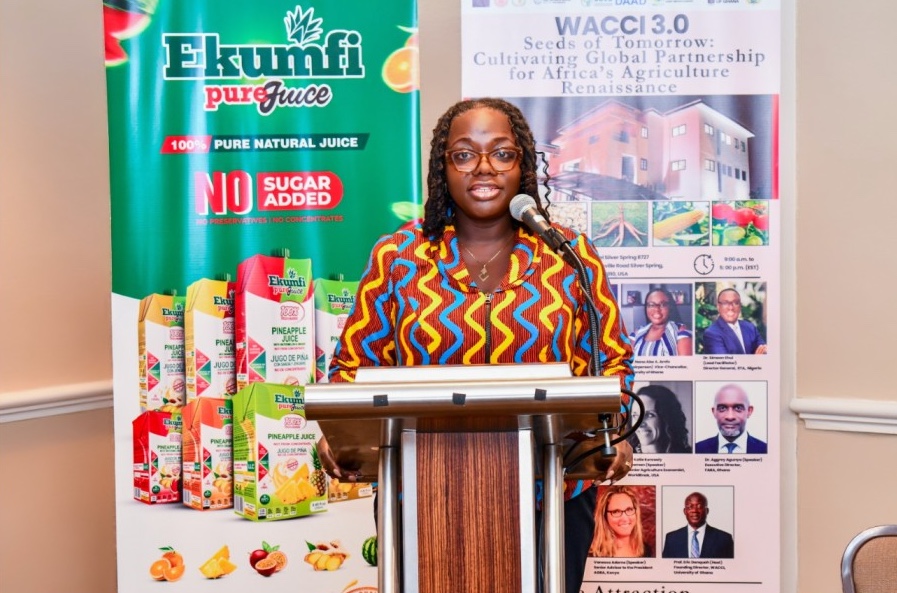
Vice-Chancellor of the University of Ghana, Prof. Nana Aba Appiah Amfo
She committed on behalf of the University’s management to provide the necessary support the Centre needs to thrive in its next phase. "The University of Ghana is proud of the outstanding performance of WACCI, and as Vice-Chancellor, I am determined to provide the needed support to ensure that WACCI more than delivers on its mandate," she added.
In his presentation to share details of the new directions and targets, Founding Director of WACCI, Prof. Eric Danquah intimated that the objective for the new phase under his leadership is geared towards ensuring sustainable food security in Africa through robust agricultural practices and indigenous seed production. He raised concerns over Ghana’s import bill and the need to adopt immediate steps towards reducing the import-driven food systems in Africa.
"We need to address the issue of Ghana’s import bill and take immediate steps towards reducing our reliance on imported food. This is crucial for the economic stability and food security of our nation." Prof. Danquah said.
Regarding the challenge with the uptake of indigenous seeds in Ghana by local farmers, Prof. Danquah mentioned limited marketing efforts, perceived quality issues and competition from imported seeds. He emphasised the fact that seeds that Ghanaian farmers use must be developed in Ghana for Ghana.
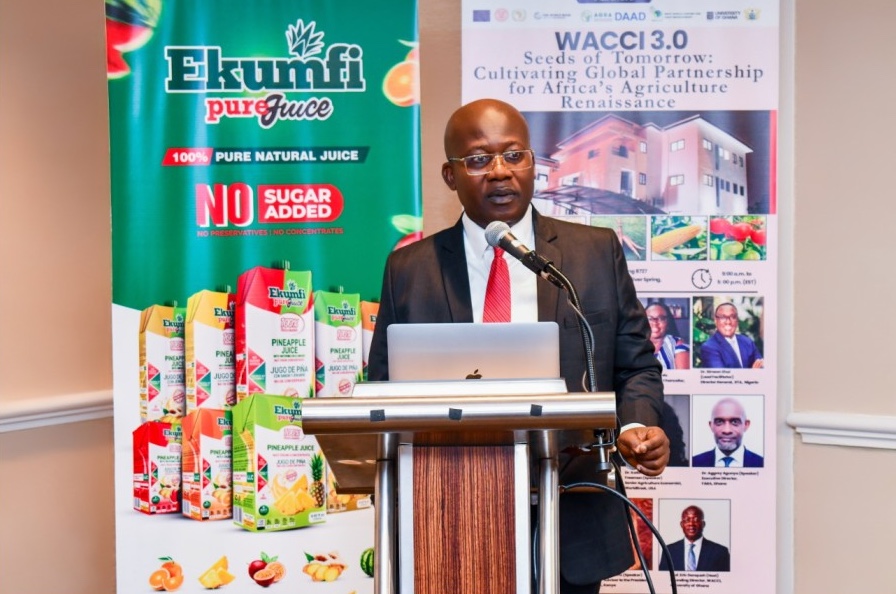
Founding Director of WACCI, Prof. Eric Danquah
"At WACCI, there are seeds of hope, but current policies do not allow farmers to access them, as local innovation is not supported," he indicated. He therefore advocated for governmental cooperation with relevant institutions possessing the technical expertise to develop capacities.
Prof. Danquah believed there is room for open global conversations on investments in training seed technologists and plant scientists at institutions like WACCI, which have built the capacity to conduct world-class training.
The WACCI Director strongly laid out the vision for the future under the WACCI 3.0 agenda. He acknowledged that it is only possible with sustainable partnerships and, therefore, the best opportunity for all international organisations and governments to commit financially.
Keynote Speaker for the launch event, Dr. Robert Betram, Chief Scientist of the Bureau for Resilience, Environment and Food Security, USAID, USA, focused his attention on USAID’s investments in crop improvement research initiatives over the years.
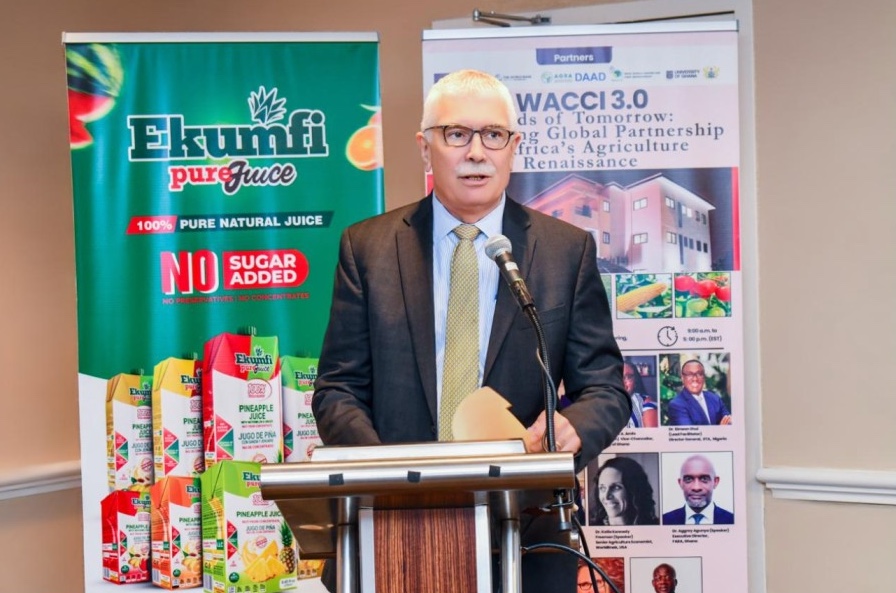
Dr. Robert Betram, Chief Scientist of the Bureau for Resilience, Environment and Food Security, USAID, USA
“The biggest thing we want to do is to intensify knowledge, particularly to equip people to make better decisions, starting at the farm and with farmers and all along the food systems,” he emphasized. “Climate change has underscored the relevance of plant breeding and crop improvement to food security. It is therefore important for African plant breeding talents to be identified and trained for Africa’s development and food security drive” he advocated.
Dr. Robert Betram congratulated the WACCI team for their relentless efforts over the past years.
Delivering framing remarks on Conversations on Funding African Centres of Excellence, Dr. Simeon Ehui, Director General, IITA, Nigeria, stated that the gathering stands as a key moment to forge global partnerships that take Africa’s development goals to new heights. He emphasized the CGIAR’s collaborative efforts with national research organizations to drive innovations in research and technology tailored to meet national priorities. He saluted the new vision underpinning WACCI 3.0 and expressed hope that the two institutions would collaborate effectively to see a transformed and developed Africa through education targeted training in the area of crop improvements.
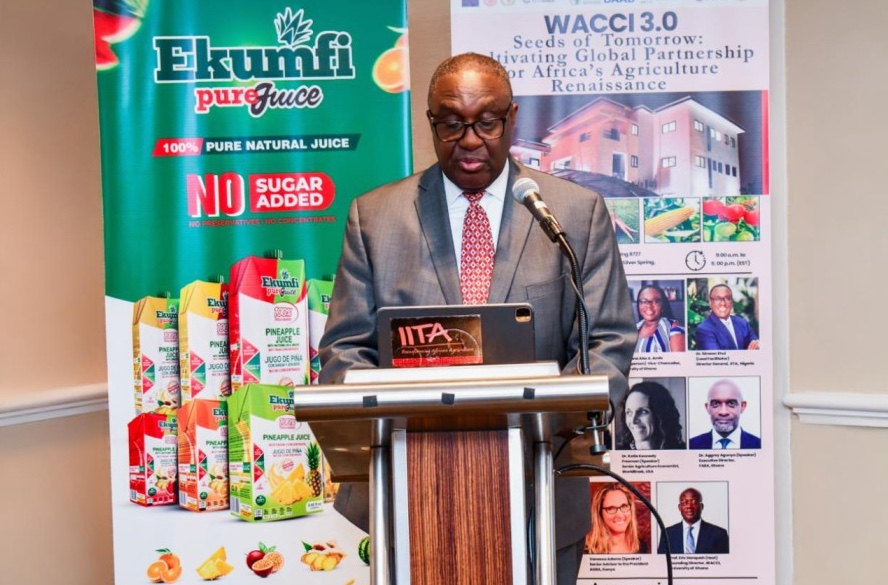
Dr. Simeon Ehui, Director General, IITA, Nigeria
Following Dr. Ehui’s presentation, there were remarks from the Dr. Tadele Gelan, Deputy Chief of Party and Head of Strategy, AGRA; Lily Mulatu, Practice Manager, Education Global Practice, The World Bank and Hon. Rev. John Ntim Fordjour, Ghana’s Deputy Minister for Education. All three speakers underscored the need for continuous support for African Centres of Excellence.
Hon. Rev. John Ntim Fordjour, who represented Ghana’s Minister for Education, was optimistic that the government will engage with the WACCI vision and provide the necessary support, as doing so will ensure Ghana’s planting for food and jobs and other agricultural industry projects will be supported.
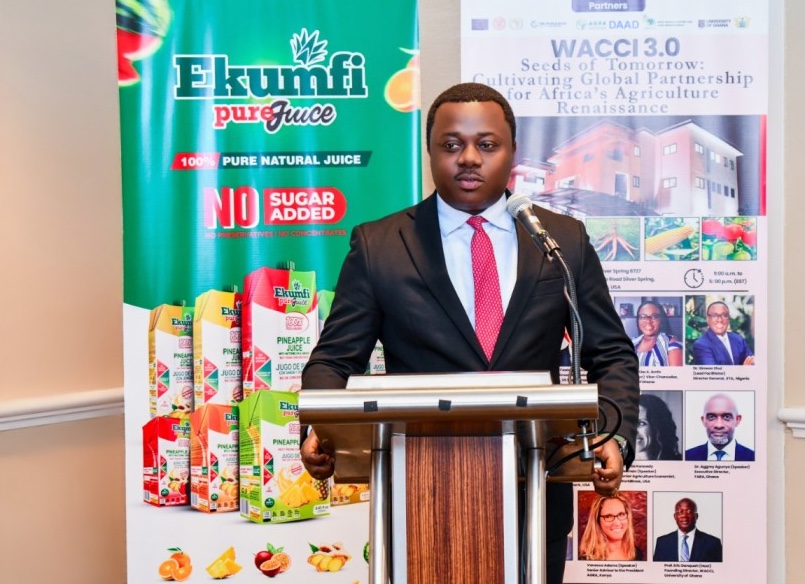
Hon. Rev. John Ntim Fordjour, Deputy Minister for Education, Ghana
A key highlight of the event was the handing over of the Chairmanship of the International Scientific Advisory Board (ISAB) of WACCI, from Dr. Eugene Terry, Senior Technical Advisor TransFarm Africa to Emeritus Prof. Ronnie Coffman, International Professor Emeritus of Plant Breeding and Genetics, Cornell University. There was a presentation of a citation of honour to Dr. Terry by WACCI in recognition of his years of service, outstanding contributions and visionary leadership.
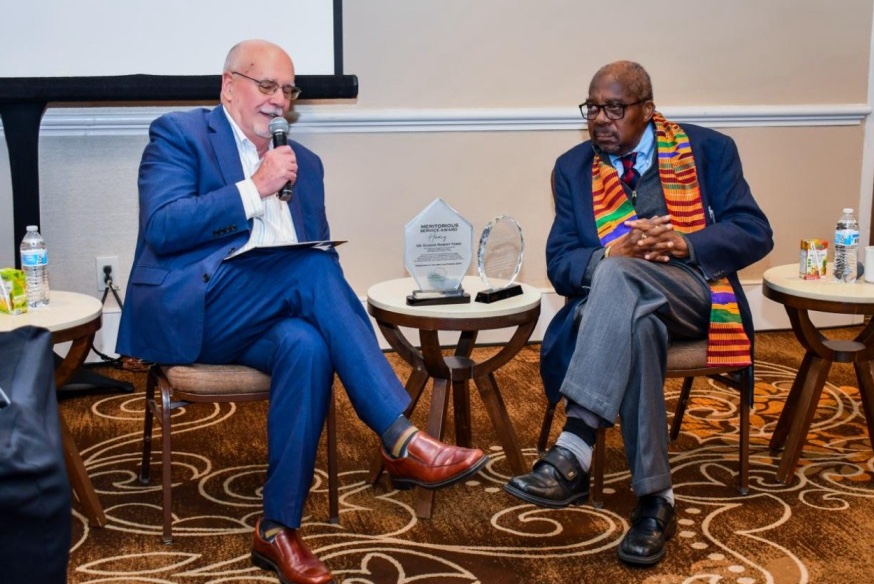
Emeritus Prof. Ronnie Coffman (left) and Dr. Eugene Terry (right)
As part of the event, there was a panel discussion on Developing Sustainable Partnerships for Agricultural Transformation in Africa. Moderated by Dr. Ekua Bentil, Task Team Leader, Africa Centre of Excellence Impact Project, World Bank, Washington DC, USA, discussants outlined various partnerships being undertaken to support agricultural transformation.
The panelists included Dr. Diana Horvath, President, 2Blades Foundation, USA; Dr. Naalamle Amissah, Associate Director, Gender, Diversity & Inclusion, West Africa Centre for Crop Improvement, University of Ghana; Dr. Hailu Wordofa, Bureau for Resilience, Environment and Food Security, USAID, USA; Dr. David Hughes, Director of USAID Innovation Lab on Current and Emerging Threats to Crops, Penn State University, USA and Mr. Kow Amponsah Sam, CEO, Ekumfi Fruits & Juices Limited.
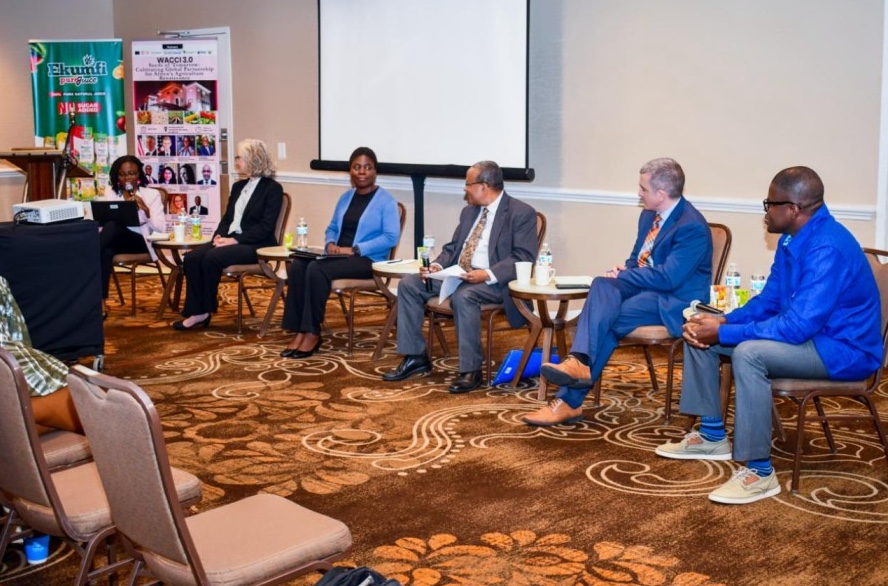
Panel session
Prior to the panel discussion, Prof. Stephen Kresovich, Director for the Innovation Lab for Crop Improvement, Cornell University, Ithaca, USA presented some highlights on Bridge Building for Crop Improvement: Science, Technology, and Education.
During the earlier segment of the program, Katie Kennedy Freeman spoke on behalf of the World Bank's Global Agricultural Practice Division, followed by Dr. Aggrey Agumya, Executive Director of the Forum for Agricultural Research in Africa (FARA), who also delivered remarks in support of WACCI's new phase.
The meeting ended with an enlightening workshop on Developing Resilient, Nutritious and Productive Varieties of Staple and Opportunity Crops for Resilient Food Systems in Africa, moderated by Teale Yalch, Senior Technical Specialist, Global Alliance for Improved Nutrition (GAIN), USA. Presentations were made by Ghanaian and International Crop Scientists on their various research projects.
Several high-level officials from top institutions in the USA and Africa's agricultural sectors graced the event, which was emceed by Ms. Pascaline K. Songsore, Senior Assistant Registrar, Public Affairs Directorate, University of Ghana. Key among them were representatives from the office of the Special Envoy on Global Food Security, Department of State, USA, Representatives from the World Bank and AGRA as well as some research institutions and individuals.
